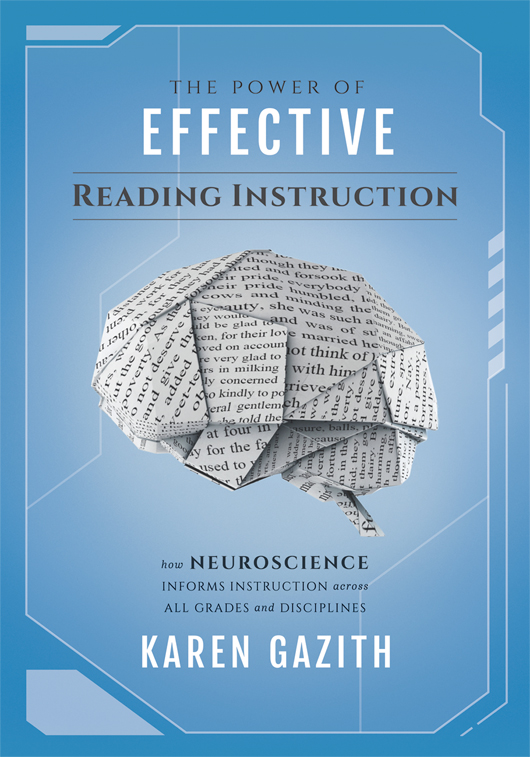Free Reproducibles
The Power of Effective Reading Instruction
How Neuroscience Informs Instruction Across All Grades and Disciplines
Karen Gazith holds a strong belief that teachers play a critical role in the success of their students. She emphasizes the need for effective instruction for all and intervention for those in need. This guide offers evidence-based practices for reading instruction that transform student proficiency across all content areas.
Benefits
- Learn what neuroscience research says about how children learn to read, why some students struggle to read, and how this knowledge informs best practices.
- Understand the Big 5 of reading and how to apply each element in their teaching.
- Gain strategies that target fundamental reading skills, like decoding and fluency.
- Master instructional approaches like acceleration, push-in and pull-out, and anchor activities to support students who are off track.
TABLE OF CONTENTS
Chapter 1: The Neuroscience of Reading
Chapter 2: The Big 5 of Literacy
Chapter 3: Reading and Response to Intervention
Chapter 4: Models for Reading Support
Chapter 5: Reading Instruction Across Content Areas
Chapter 6: Strategic Teaching and Learning
PRINTABLE REPRODUCIBLES
Chapter 1
Chapter 2
- Figure 2.4: Adler’s Close Reading Template for First Reading of the Text
- Figure 2.5: Adler’s Close Reading Template for Second Reading of the Text
- Figure 2.6: Adler’s Close Reading Template for Third Reading of the Text
- The Big 5 of Literacy: Next Steps
Chapter 3
Chapter 4
Chapter 5
- Figure 5.1: During Reading Questions
- Figure 5.2: Five Expository Text Structures, Their Word Cues, and Graphic Organizers
- Figure 5.3: Sample Tea Party List of Words and Definitions
- Figure 5.4: PMI Strategy Example
- Figure 5.5: Advanced Organizer for a Text on Animal Habitats
- Figure 5.6: Example of a Frayer Diagram
- Reading Instruction Across Content Areas: Next Steps
Chapter 6
SUGGESTED RESOURCES
BOOKS
- Buffum, A., Mattos, M., & Malone, J. (2012). Simplifying response to intervention: Four essential guiding principles. Bloomington, IN: Solution Tree Press.
- Buffum, A., Mattos, M., & Malone, J. (2018). Taking action: A handbook for RTI at work. Bloomington, IN: Solution Tree Press.
- Gazith, K. (2021). Teaching with purpose: How to thoughtfully implement evidence-based practices in your classroom. Bloomington, IN: Solution Tree Press.
- Marzano, R. J. (2017). The new art and science of teaching. Bloomington, IN: Solution Tree Press & ASCD.

